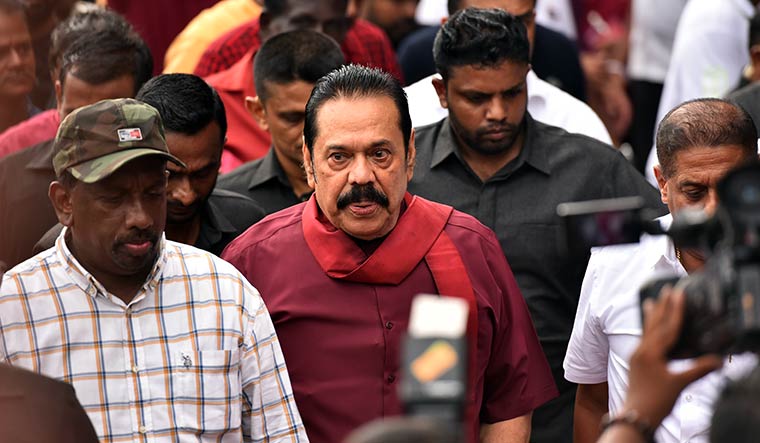ON MAY 1, former president Mahinda Rajapaksa addressed a well-attended May Day rally at the Campbell Park ground in Colombo. It was his second public meeting after the Rajapaksa clan was dislodged from power a year ago. The 77-year-old leader confessed to the crowd that his family could not do justice to the overwhelming mandate people had given them. He said they made certain “wrong decisions” and urged the people to “unite to overcome the challenges and take the country towards victory”.
For the Sri Lanka Podujana Party (SLPP) run by the Rajapaksa clan, the rally was a show of success. “It was a cheerful crowd,” said party MP S.M. Chandrasena. The SLPP remains the largest party in parliament and President Ranil Wickremesinghe relies heavily on its MPs as he tries to work out a deal with the International Monetary Fund to revive the Sri Lankan economy.
Though the Aragalaya movement was successful in sensitising the youth against corruption and in making them invested in politics, the SLPP is confident that the Sinhala majoritarian feeling is still alive in the country. Besides, no other party in Sri Lanka has a sizeable presence across the country. The day-to-day affairs of the SLPP is now managed by Mahinda's eldest son Namal Rajapaksa, who hopes to attract more young members to the party.
A year ago, when Gotabaya Rajapaksa was forced to quit as president and flee the country following the Aragalaya protests, most observers were prepared to write the Rajapaksas off. They saw Gotabaya's retreat as a clear symbol of relinquishing power. The Aragalaya movement did the unthinkable to a man known for his authoritarian streak and ruthlessness. But those close to Gotabaya say he fled because he did not want to hurt his people. “Gotabaya is not an autocratic leader. He is a man of simplicity,” said Eranda Ginige, a former adviser to Gotabaya. “As a man who won the civil war, he never wanted to use violence to stifle the protests. He is a strong proponent of constitutional democracy. Even when protesters broke into his residence, he did not ask to control them.”
According to sources close to the Rajapaksa family, even India had advised him not to step down or flee the country. But everything went out of control as Gotabaya did not want to use the military to crush the protests. “The Indian government very clearly told him to continue in office. It was his decision to go. It happened because he had isolated himself at that time,” said Rohan Gunaratna, former director general of the Institute of National Security Studies, Sri Lanka.
While Gotabaya was responsible for his own decisions, the family feels that there was a larger conspiracy by external forces to throw the family out of power. They even suspect a foreign hand in funding the protests. “I strongly believe that Aragalaya was part of a conspiracy. Most of the kids who went to Aragalaya are victims of the conspiracy. They didn’t know what they were doing,” said Namal.
Although the Rajapaksas are eyeing a comeback, there are differences within the family about several decisions made by Gotabaya. For instance, Gotabaya had asked Mahinda to step down as prime minister. As per the Sri Lankan constitution, if the president quits, the prime minister can take over. Had Mahinda been allowed to continue, he could have taken over when Gotabaya left. “He should not have fled the country. That was a bad decision,” said Namal.
Gotabaya has, meanwhile, dropped hints that he is not interested in making a comeback to politics. Mahinda and other members of the family, however, see a more active political role for themselves. World leaders, including top leaders from India, continue to be in touch with Mahinda. Namal said his father still enjoyed a huge appeal among the Sinhala majority. “He is still popular among the masses. And people believe in him, especially the SLPP followers and those who voted for Gotabaya. A majority of them voted for him because of Mahinda,” he said.
Namal has been travelling across Sri Lanka, meeting office-bearers and cadres of the SLPP. His efforts are supplemented by Mahinda’s younger brother Basil, who is working on a political strategy to bring the family back to power. When the Rajapaksas were out of power in the past, it was Basil’s groundwork that helped them launch the SLPP and make a comeback.
Though the Wickremesinghe government appears stable at the moment, political observers feel that it is a temporary arrangement which could change once the IMF deal is worked out. “The MPs have become extremely corrupt. Their support comes based on many conditions even for passing bills,” said an SLPP member. And the Rajapaksas believe that they are ready to take over when the right moment arrives. “As a family, we believe that we have done our best,” said Namal. “My father has done enough for the people.”


